Week One
Poetry Workshop
Discovery of Light: Movement & Writing
with Ruth Forman
June 24, 26, 28 • 8:30 – 10:30 a.m. • Ballroom, Literary Arts Center at Alumni Hall
Course # 1523
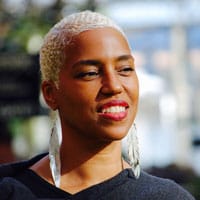 Course Description: This workshop offers a combination of qi gong and creative writing as an outlet for expression. The movements of qi gong work in conjunction with the energy highways (meridians) that run throughout the human body, helping to open, smooth out and make even the flow of the body’s energies. Afterward, creative writing offers a space for participants’ genius to emerge. Participants connect with a focused personal power through writing, then share with each other in a unified space. This is a generative poetry workshop.
Course Description: This workshop offers a combination of qi gong and creative writing as an outlet for expression. The movements of qi gong work in conjunction with the energy highways (meridians) that run throughout the human body, helping to open, smooth out and make even the flow of the body’s energies. Afterward, creative writing offers a space for participants’ genius to emerge. Participants connect with a focused personal power through writing, then share with each other in a unified space. This is a generative poetry workshop.
Participants should wear comfortable clothing, be able to take shoes off, and come to class prepared with something to write on and write with (pen/pencil and paper/notebook).
Bio: Ruth Forman is an acclaimed poet, author, and friend of words. She is the award-winning author of best-selling children’s books Curls, Glow, Bloom, Ours, One, and Like So, children’s book Young Cornrows Callin Out the Moon, and poetry collections We Are the Young Magicians, Renaissance, and Prayers Like Shoes. Ruth has received the Barnard New Women Poets Prize, The Pen Oakland Josephine Miles Literary Award, The National Council of Teachers of English Notable Book Award, and recognition by The American Library Association. She is a former teacher of creative writing with June Jordan’s Poetry for the People program at UC Berkeley and the University of Southern California as well as a longtime faculty member with the VONA writing program. Ruth is currently a professor at the Middlebury Bread Loaf School of English. When not writing and teaching, she practices a passion for classical Yang family style tai chi chuan. You learn more about her at ruthforman.com.
Prose Workshop
Not So Fast
with Charlotte Matthews
June 24, 26, 28 • 1:15 – 3:15 p.m. • Prose Room, Literary Arts Center at Alumni Hall
Course # 1527
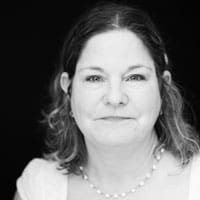 Course Description: This workshop will focus on slowing down and sharpening awareness of and curiosity about the natural world. Through practices of faithful observation, daily journaling, and honoring plain language, the workshop will invite you to re-see what surrounds you and invigorate you to weave that into story. Though primarily a generative workshop, you will also get a chance for feedback each day. Our mantra will be Mary Oliver’s assertion: To pay attention, this is our endless and proper work.
Course Description: This workshop will focus on slowing down and sharpening awareness of and curiosity about the natural world. Through practices of faithful observation, daily journaling, and honoring plain language, the workshop will invite you to re-see what surrounds you and invigorate you to weave that into story. Though primarily a generative workshop, you will also get a chance for feedback each day. Our mantra will be Mary Oliver’s assertion: To pay attention, this is our endless and proper work.
Bio: Charlotte Matthews is author of five poetry collections, a novel, and a memoir, Comes with Furniture and People (finalist Indie Awards finalist Women’s Issues). Associate Professor at The University of Virginia, she is the recipient of the Adele F. Roberts Award for Excellence in Teaching. A veteran Chautauqua writer-in-residence, she is committed to helping others recognize the power of their own voices and stories.
Week Two
Poetry Workshop
Getting Unstuck
with Lillian-Yvonne Bertram
July 1, 3, 5 • 8:30 – 10:30 a.m. • Poetry Room, Literary Arts Center at Alumni Hall
Course # 1524
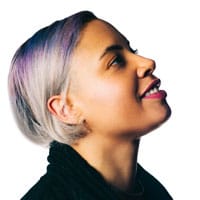 Course Description: Often, we reach a point with a poem and realize it’s not quite done, but we don’t quite know how to move forward and finish it… Maybe it’s missing something, or maybe it just needs a greater attention to the language or structure. Or maybe, we are just stuck! In this flexible workshop, we will consider various strategies for revision—“re-seeing” our poems—from the conceptual to mechanical, such as experimenting with different forms and techniques. Sometimes, revision means we get unstuck with a poem, or we write an entirely new poem! The important part is being open to various possibilities for a poem to help us know which direction we want to go.
Course Description: Often, we reach a point with a poem and realize it’s not quite done, but we don’t quite know how to move forward and finish it… Maybe it’s missing something, or maybe it just needs a greater attention to the language or structure. Or maybe, we are just stuck! In this flexible workshop, we will consider various strategies for revision—“re-seeing” our poems—from the conceptual to mechanical, such as experimenting with different forms and techniques. Sometimes, revision means we get unstuck with a poem, or we write an entirely new poem! The important part is being open to various possibilities for a poem to help us know which direction we want to go.
Bio: Lillian-Yvonne Bertram is an African American writer, poet, artist, and educator who works at the intersection of computation, AI, race, and gender. They are the author of Travesty Generator (Noemi Press), a book of computational poetry that received the Poetry Society of America’s 2020 Anna Rabinowitz prize for interdisciplinary work and longlisted for the 2020 National Book Award for Poetry. They are the recipient of a National Endowment for the Arts Poetry Fellowship. Their other poetry books include How Narrow My Escapes (DIAGRAM/New Michigan), Personal Science (Tupelo Press), a slice from the cake made of air (Red Hen Press), and But a Storm is Blowing From Paradise (Red Hen Press). Their most recent full length poetry book, Negative Money, was published in 2023. Their new chapbook, written with AI, is called A Black Story May Contain Sensitive Content and won the 2023 Diagram/New Michigan chapbook contest. They direct the MFA in creative writing program at the University of Maryland and are a 2024 Foundation for Contemporary Arts grant recipient.
Prose Workshop
Making Meaning While Writing from Life
with Chloé Caldwell
July 1, 3, 5 • 1:15 – 3:15 p.m. • Prose Room, Literary Arts Center at Alumni Hall
Course # 1528
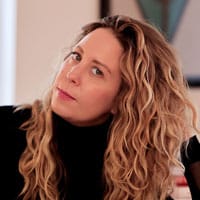 Course Description: “Why would anyone care what I have to say?” This is a refrain I hear from writers and students alike consistently. In this generative writing workshop, students will learn techniques for making the mundane matter. When memoir is written from a place of hyper-specificity, it becomes universal. Chloe will provide in-class writing exercises, lectures, and readings for discussion. Students will leave with new work generated, more writer friends, exposure to new memoirists, and tools for moving forward in their own projects.
Course Description: “Why would anyone care what I have to say?” This is a refrain I hear from writers and students alike consistently. In this generative writing workshop, students will learn techniques for making the mundane matter. When memoir is written from a place of hyper-specificity, it becomes universal. Chloe will provide in-class writing exercises, lectures, and readings for discussion. Students will leave with new work generated, more writer friends, exposure to new memoirists, and tools for moving forward in their own projects.
Bio: Chloé Caldwell is the author of four books: The Red Zone: A Love Story, the critically acclaimed novella, Women, and the essay collections Legs Get Led Astray and I’ll Tell You in Person. and Chloe’s next book, Trying, is forthcoming from Graywolf Press in 2025. Her novella WOMEN will be reissued by Harper Perennial on June 4th, 2024. She is the co-founder of Scrappy Literary where she runs writing retreats and offers personalized support for writers.
Her essays have appeared in The New York Times, Bon Appétit, New York Magazine’s The Cut, The Strategist, Romper, Buzzfeed, Longreads, Vice, Nylon, Salon, Medium, The Rumpus The Sun, and half a dozen anthologies including Goodbye To All That: Writers on Loving and Leaving NYC and Without A Net: The Female Experience of Growing Up Working Class, and Sluts. Her essay “Hungry Ghost” was listed as Notable in Best American Nonrequired Reading. She lives in Hudson, NY. www.chloesimonne.com
Multi-Genre Workshop
A Summer of Wonder: Seeing Nature and Writing It in Chautauqua
with John Brantingham
July 4 • 8:30 – 10:30 a.m. • Prose Room, Literary Arts Center at Alumni Hall
Course # 1536
Session One | Week Two: Writing Nature and the Idea of Radical Wonder
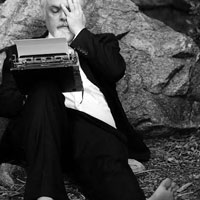 Course Description: A summer-long class that combines in-person and online elements. We will be studying writing in the classroom at the Chautauqua Institution. Along with this, every day of the season, participants in the class will receive a video prompt for a poem and a prose piece. These prompts will be unified so students who do participate in this activity will have a complete first draft of a poetry or prose collection at the end of the summer. John Brantingham will help them to publish these collections in magazines and as book-length collections. Students who do not want to write will not have to. This is completely optional, so if you are interested in intensive writing or if you are just interested in the history and methods for nature writing, this is a class for you.
Course Description: A summer-long class that combines in-person and online elements. We will be studying writing in the classroom at the Chautauqua Institution. Along with this, every day of the season, participants in the class will receive a video prompt for a poem and a prose piece. These prompts will be unified so students who do participate in this activity will have a complete first draft of a poetry or prose collection at the end of the summer. John Brantingham will help them to publish these collections in magazines and as book-length collections. Students who do not want to write will not have to. This is completely optional, so if you are interested in intensive writing or if you are just interested in the history and methods for nature writing, this is a class for you.
Bio: John Brantingham was Sequoia and Kings Canyon National Parks’ first poet laureate and a Professor of English and Creative Writing at Mt. San Antonio College for 25 years. His work has been featured in hundreds of magazines, Writers Almanac and The Best Small Fictions 2016 and 2022. He has twenty-one books of poetry and fiction including his novella-in-flash Life: Orange to Pear (Bamboo Dart Press) and memoir-in-flash Kitkitdizzi with Ann Brantingham (Bamboo Dart Press). His series of poetry and prose books about nature is coming soon from Arroyo Seco Press. He is the founder and general editor of The Journal of Radical Wonder.
Week Three
Poetry Workshop
Poetry and Passion: Heartwarming Ideas for Poems and Picture Books
with Van G. Garrett
July 8, 10, 12 • 8:30 – 10:30 a.m. • Poetry Room, Literary Arts Center at Alumni Hall
Course # 1525
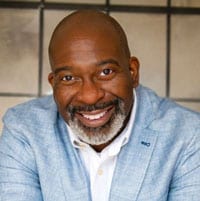 Course Description: Participants will learn how to create poems with heart and soul. Additionally, they will explore writing territories, survey model texts, examine poetic forms, and they will discover writing possibilities for poems and picture books. Informative and informal, this generative workshop will allow writers and artists to learn in supportive, productive, and engaging ways.
Course Description: Participants will learn how to create poems with heart and soul. Additionally, they will explore writing territories, survey model texts, examine poetic forms, and they will discover writing possibilities for poems and picture books. Informative and informal, this generative workshop will allow writers and artists to learn in supportive, productive, and engaging ways.
Bio: Van G. Garrett is the author of thirteen books. His debut picture book, Kicks, is an ode to the flyest shoes and those who wear them, was published in 2022 (Versify/HarperCollins). His second picture book, Juneteenth, was also published by Versify/HarperCollins in 2023. Van’s updates and appearances can be found at www.vanggarrettpoet.com.
Prose Workshop
Our Lives, Our Stories
with Jimin Han
July 8, 10, 12 • 1:15 – 3:15 p.m. • Prose Room, Literary Arts Center at Alumni Hall
Course # 1529
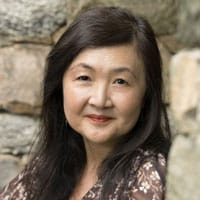 Course Description: Our lives are rich with stories passed on from families and friends. How do you decide what’s material for a short story, novel, essay or memoir that anyone outside your family will want to read? How do you decide which details to keep and which to discard? How do you shape your narrative into work that lasts? In this generative writing class, we’ll engage in writing exercises that help us explore these questions, read excerpts of contemporary fiction and nonfiction to examine choices authors have made, and share our writing.
Course Description: Our lives are rich with stories passed on from families and friends. How do you decide what’s material for a short story, novel, essay or memoir that anyone outside your family will want to read? How do you decide which details to keep and which to discard? How do you shape your narrative into work that lasts? In this generative writing class, we’ll engage in writing exercises that help us explore these questions, read excerpts of contemporary fiction and nonfiction to examine choices authors have made, and share our writing.
Bio: Jimin Han is the author of The Apology (Little, Brown and Co.), which was a 2023 Barnes and Noble Discover Pick, LA Times Most Anticipated Book, Vanity Fair Best New Book, and Apple Books Best of August. She is also the author of A Small Revolution. Additional writing of hers can be found at American Public Media’s Weekend America, Poets & Writers, Catapult, and other media outlets. She teaches at The Writing Institute at Sarah Lawrence College, Pace University, and community writing centers. Born in Seoul, South Korea, she grew up in Providence, Rhode Island; Dayton, Ohio; and Jamestown, New York. Her work has been supported by the New York State Council on the Arts.
Week Four
Poetry Workshop
Poetry in Motion
with Julianne Neely
July 15, 17, 19 • 8:30 – 10:30 a.m. • Poetry Room, Literary Arts Center at Alumni Hall
Course # 1526
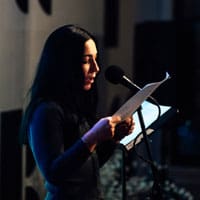 Course Description: In a world that is home to eight billion individuals, diversity is a fundamental aspect of our shared humanity. This generative poetry workshop celebrates the richness of cultural, ethnic, and linguistic diversity by inviting participants to explore and express their unique identities through poetry. With collaborative exercises and open discussions, we’ll delve into themes of cultural exchange, embracing differences, and finding common ground in our shared human experience. Participants will have the opportunity to craft poetic pieces that pay homage to their roots while fostering a deeper appreciation for the vibrant tapestry of humanity. Additionally, we will explore various poetic forms inspired by historical and diverse cultural traditions—allowing participants to channel their creativity through diverse literary expressions.
Course Description: In a world that is home to eight billion individuals, diversity is a fundamental aspect of our shared humanity. This generative poetry workshop celebrates the richness of cultural, ethnic, and linguistic diversity by inviting participants to explore and express their unique identities through poetry. With collaborative exercises and open discussions, we’ll delve into themes of cultural exchange, embracing differences, and finding common ground in our shared human experience. Participants will have the opportunity to craft poetic pieces that pay homage to their roots while fostering a deeper appreciation for the vibrant tapestry of humanity. Additionally, we will explore various poetic forms inspired by historical and diverse cultural traditions—allowing participants to channel their creativity through diverse literary expressions.
Bio: Julianne Neely received her MFA degree from the Iowa Writer’s Workshop, where she received the Truman Capote Fellowship, the 2017 John Logan Poetry Prize, and a Schupes Fellowship for Poetry. She is currently a Poetics PhD student and an English Department Fellow at the University at Buffalo. Her writing has been published in Hyperallergic, VIDA, The Poetry Project, The Rumpus, The Iowa Review and more. She has three chapbooks out with Slope Editions, garden-door Press, and Foundlings Press and a forthcoming digital chapbook from Metatron Press.
Prose Workshop
Writing by the Spirit
with Nana Ekua Brew–Hammond
July 15, 17, 19 • 1:15 – 3:15 p.m. • Prose Room, Literary Arts Center at Alumni Hall
Course # 1530
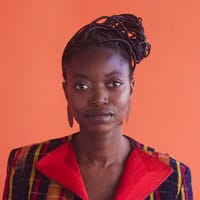 Course Description: This generative workshop is for writers who see their work as a spiritual practice; are interested in putting words to life’s temporal and eternal mysteries; and/or are eager to infuse their writing with a transcendent hope. Inspired by sacred texts, and writers who mine the divine like Christina Rosetti, James Baldwin, Miral al-Tahawy, Ingrid Rojas Contreras, and Cole Arthur Riley, learn how to express and apply inspired insights to original work and works in progress. This will be a safe space to explore and share personal experiences, histories and journeys with faith. All genres welcome.
Course Description: This generative workshop is for writers who see their work as a spiritual practice; are interested in putting words to life’s temporal and eternal mysteries; and/or are eager to infuse their writing with a transcendent hope. Inspired by sacred texts, and writers who mine the divine like Christina Rosetti, James Baldwin, Miral al-Tahawy, Ingrid Rojas Contreras, and Cole Arthur Riley, learn how to express and apply inspired insights to original work and works in progress. This will be a safe space to explore and share personal experiences, histories and journeys with faith. All genres welcome.
Bio: Nana Ekua Brew-Hammond is the author of the children’s picture book BLUE: A History of the Color as Deep as the Sea and as Wide as the Sky (Knopf), illustrated by Caldecott Honor Artist Daniel Minter. Named among the best books of 2022 by NPR, New York Public Library, Chicago Public Library, Kirkus Reviews, Bank Street College of Education, and The Center for the Study of Multicultural Literature, BLUE was honored with the 2023 NCTE Orbis Pictus Award® recognizing excellence in the writing of non-fiction for children; it was named to the 2023-2024 Texas Bluebonnet Award Master List; and it was nominated for an NAACP Image Award. Most recently, it was announced as part of the 2023 Capitol Choices list of Noteworthy Books for Children and Teens. Brew-Hammond also wrote the young adult novel Powder Necklace (Atria), which Publishers Weekly called “a winning debut”. For adult readers, she edited RELATIONS: An Anthology of African and Diaspora Voices (HarperVia), of which Kirkus Reviews said in a starred review: “This smart, generous collection is a true gift.” In 2023, she partnered with the curators of Brooklyn Museum’s “Africa Fashion” exhibit to pen and perform an original poem in the Museum’s companion film. Her newest novel for adults, My Parents’ Marriage (Amistad), releases in the U.S. July 9, 2024. Every month, she co-leads a writing fellowship whose mission is to write light into darkness. Born to Ghanaian immigrants in New York, she splits her time between Oakland, CA and Queens, NY. Learn more at nanabrewhammond.com.
Multi-Genre Workshop
A Summer of Wonder: Seeing Nature and Writing It in Chautauqua
with John Brantingham
July 18 • 8:30 – 10:30 a.m. • Prose Room, Literary Arts Center at Alumni Hall
Course # 1536
Session Two | Week Four: Attuning Ourselves to Nature: Seeing What Is Really There in Nature and Ourselves
 Course Description: A summer-long class that combines in-person and online elements. We will be studying writing in the classroom at the Chautauqua Institution. Along with this, every day of the season, participants in the class will receive a video prompt for a poem and a prose piece. These prompts will be unified so students who do participate in this activity will have a complete first draft of a poetry or prose collection at the end of the summer. John Brantingham will help them to publish these collections in magazines and as book-length collections. Students who do not want to write will not have to. This is completely optional, so if you are interested in intensive writing or if you are just interested in the history and methods for nature writing, this is a class for you.
Course Description: A summer-long class that combines in-person and online elements. We will be studying writing in the classroom at the Chautauqua Institution. Along with this, every day of the season, participants in the class will receive a video prompt for a poem and a prose piece. These prompts will be unified so students who do participate in this activity will have a complete first draft of a poetry or prose collection at the end of the summer. John Brantingham will help them to publish these collections in magazines and as book-length collections. Students who do not want to write will not have to. This is completely optional, so if you are interested in intensive writing or if you are just interested in the history and methods for nature writing, this is a class for you.
Bio: John Brantingham was Sequoia and Kings Canyon National Parks’ first poet laureate and a Professor of English and Creative Writing at Mt. San Antonio College for 25 years. His work has been featured in hundreds of magazines, Writers Almanac and The Best Small Fictions 2016 and 2022. He has twenty-one books of poetry and fiction including his novella-in-flash Life: Orange to Pear (Bamboo Dart Press) and memoir-in-flash Kitkitdizzi with Ann Brantingham (Bamboo Dart Press). His series of poetry and prose books about nature is coming soon from Arroyo Seco Press. He is the founder and general editor of The Journal of Radical Wonder.
Week Five
Poetry Workshop
Difficult Questions, Poetic Wonderings: Vulnerability and the Self
with Frank X. Walker, II
July 22, 24, 26 • 8:30 – 10:30 a.m. • Poetry Room, Literary Arts Center at Alumni Hall
Course # 1515
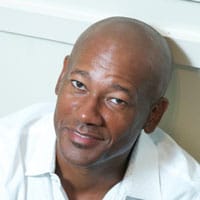 Course Description: If strong people make strong families who make strong communities which make strong nations that in turn make strong people, imagine that we could create a better world by simply focusing on writing our way to being better people. Utilizing memory, research, imagination, and empathy, this generative workshop will encourage and provide a brave space for participants to creatively explore difficult questions: How much do your burdens and accepted responsibilities weigh? Who is really in that mirror? If the solution to your problem was free, could you afford it? To whom do you owe an apology? The bitter taste of defeat is almost cliché, disappointment leaves a sour taste, but what does forgiveness taste like?
Course Description: If strong people make strong families who make strong communities which make strong nations that in turn make strong people, imagine that we could create a better world by simply focusing on writing our way to being better people. Utilizing memory, research, imagination, and empathy, this generative workshop will encourage and provide a brave space for participants to creatively explore difficult questions: How much do your burdens and accepted responsibilities weigh? Who is really in that mirror? If the solution to your problem was free, could you afford it? To whom do you owe an apology? The bitter taste of defeat is almost cliché, disappointment leaves a sour taste, but what does forgiveness taste like?
We will approach these interrogatives while exploring a variety of poetic forms including free verse, the selfie, the abecedarian, and the burning haibun. Modern forms have done much to subvert and to escape the rules of strict meter and rhyme that defined most poetry in the 19th and early 20th centuries, and this workshop is designed to give you the freedom to explore beyond those conventions. The workshop is suitable for all writers. This week can strengthen your skills as a poet, memoirist, and/or storyteller. Participants are encouraged to bring a handheld mirror and a photo of family—whatever you consider family to be.
Bio: Multidisciplinary artist and educator, Frank X Walker, is the first African American writer to be named Kentucky Poet Laureate. He is the author of the children’s book, A is for Affrilachia, and thirteen collections of poetry, including Turn Me Loose: The Unghosting of Medgar Evers, which was awarded the 2014 NAACP Image Award for Poetry and the Black Caucus American Library Association Honor Award. Voted one of the most creative professors in the south, Walker coined the term “Affrilachia” and co-founded the Affrilachian Poets. He serves as Professor of Creative Writing and African American and Africana Studies at the University of Kentucky.
Prose Workshop
Empower Your Writer Within
with Stacy Hawkins Adams
July 22, 24, 26 • 1:15 – 3:15 p.m. • Prose Room, Literary Arts Center at Alumni Hall
Course # 1531
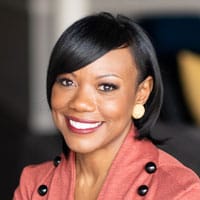 Course Description: In this workshop we’ll explore why telling your story matters and how you can craft it for publication or personal accomplishment. Whether you’re writing fiction (a novel, short story or children’s book), or nonfiction (a memoir or collection of essays), we’ll engage in the process of refining your writing goals and your writing methods. This generative workshop is ideal for those who want to hone your voice, add depth to your writing, and get from the idea stage to “The End.”
Course Description: In this workshop we’ll explore why telling your story matters and how you can craft it for publication or personal accomplishment. Whether you’re writing fiction (a novel, short story or children’s book), or nonfiction (a memoir or collection of essays), we’ll engage in the process of refining your writing goals and your writing methods. This generative workshop is ideal for those who want to hone your voice, add depth to your writing, and get from the idea stage to “The End.”
Bio: Stacy Hawkins Adams is the award-winning author of nine women’s fiction novels and three nonfiction books that help readers find relevance in their own stories.
The novels she has produced over the past twenty years include Watercolored Pearls, a featured title in college coursework; Coming Home, a Target stores “Recommended Read,” The Someday List, an Essence magazine bestseller, and Dreams That Won’t Let Go, a Library of Virginia literary award finalist. Her nonfiction work includes a recently released single-poem chapbook titled The Pivot, which speaks through poetic verses to women who are dancing with resilience through what each season of life requires.
Her books have been traditionally published by HarperCollins and Baker Publishing Group, and through her own imprint, Spring Rock Publishing. She also has produced a compilation of original quotes and musings for a greeting card collection that features the photography of actress/author Daphne Maxwell Reid.
A former newspaper reporter and columnist, Stacy occasionally pens articles and essays for national publications and maintains an inspirational blog at LifeUntapped.com.
Stacy leads writing workshops in her local community and around the nation, and occasionally hosts inspirational storytelling events for readers and writers.
Learn more about her body of work at StacyHawkinsAdams.com.
Week Six
Poetry Workshop
Soul Portraits: Slam Poetry as a Deep Dive Inside the Heart
with Gayle Danley
July 29, July 31, August 2 • 8:30 – 10:30 a.m. • Poetry Room, Literary Arts Center at Alumni Hall
Course # 1516
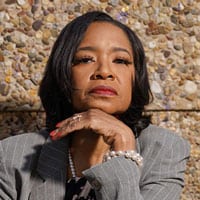 Course Description: Influenced by the passionate wordsmiths of the Nuyorican Poets Cafe, Former International Poetry Slam Champion Gayle Danley’s session will free participants of all skill levels to truly express themselves through the spoken word. Attendees will experience Gayle’s simple writing and performing process allowing them to delve into the sweetest parts of their souls. This generative workshop will create a space full of nurturing, learning, laughing and discovering what lies inside of ourselves and celebrate the power we all have to share our journeys on stage. Judgement and expectation free.
Course Description: Influenced by the passionate wordsmiths of the Nuyorican Poets Cafe, Former International Poetry Slam Champion Gayle Danley’s session will free participants of all skill levels to truly express themselves through the spoken word. Attendees will experience Gayle’s simple writing and performing process allowing them to delve into the sweetest parts of their souls. This generative workshop will create a space full of nurturing, learning, laughing and discovering what lies inside of ourselves and celebrate the power we all have to share our journeys on stage. Judgement and expectation free.
Bio: After winning the International Poetry Slam in Heidelberg Germany, poet Gayle Danley entered America’s classrooms, teaching children the power of words as an aid in healing trauma and creating a life of hope and options.
Gayle facilitates grief writing workshops with Johns Hopkins and Sinai Hospital in Baltimore, Maryland, and she also works with women experiencing homelessness, showing them how to use their words to find home. CBS 60 Minutes, The Baltimore Sun, Washington Post and New York Times have profiled her work as a teaching artist and stage performer.
Gayle provides professional development for teachers at the National Gallery of Art in Washington, DC and heightening their experience of the museum’s works of art. She served as the Maryland Library Association Poet of the Year and is a former national Young Audiences Artist of the Year. Gayle lives in Silver Spring, Md with her beautiful Boys, Noah and Nolan and her cat Olive.
Prose Workshop
The Art of Brevity
with Grant Faulkner
July 29, July 31, August 2 • 1:15 – 3:15 p.m. • Prose Room, Literary Arts Center at Alumni Hall
Course # 1532
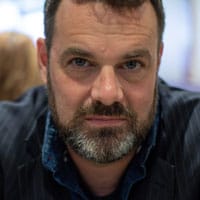 Course Description: In flash fiction, the whole is a part, and the part is a whole. The form forces the writer to question each word, to reckon with Flaubert’s mot juste, and move a story by hints and implications. Flash stories are built through gaps as much as the connective tissue of words, so what’s left out of a story is often more important than what’s included. In this generative workshop, we will discuss how a different type of creativity emerges within a hard compositional limit, exploring the many different forms that short shorts can take. Come prepared to write short pieces and explore the expansiveness of succinctness.
Course Description: In flash fiction, the whole is a part, and the part is a whole. The form forces the writer to question each word, to reckon with Flaubert’s mot juste, and move a story by hints and implications. Flash stories are built through gaps as much as the connective tissue of words, so what’s left out of a story is often more important than what’s included. In this generative workshop, we will discuss how a different type of creativity emerges within a hard compositional limit, exploring the many different forms that short shorts can take. Come prepared to write short pieces and explore the expansiveness of succinctness.
Bio: Grant Faulkner is the co-founder of 100 Word Story, the former Executive Director of National Novel Writing Month (NaNoWriMo), and an Executive Producer of the upcoming TV show America’s Next Great Author.
He has published three books on writing, The Art of Brevity; Pep Talks for Writers: 52 Insights and Actions to Boost Your Creative Mojo; and Brave the Page, a teen writing guide. He’s also published All the Comfort Sin Can Provide, Fissures (a collection of 100-word stories), and Nothing Short of 100: Selected Tales from 100 Word Story.
His stories have appeared in dozens of literary magazines, including Tin House, The Southwest Review, and The Gettysburg Review, and he has been anthologized in collections such as Norton’s Flash Fiction America; New Micro: Exceptionally Short Fiction; and Best Small Fictions. His essays on creativity have been published in The New York Times, Poets & Writers, LitHub, Writer’s Digest, and The Writer.
Additionally, Grant serves on the National Writing Project’s Writer’s Council, Left Margin Lit’s Advisory Council, and Aspen Words’ Creative Council. He’s also the co-host of the podcast Write-minded and the author of a weekly newsletter: Intimations: A Writer’s Discourse.
Follow him on Twitter at @grantfaulkner and on Instagram at @grantfaulkner.
Multi-Genre Workshop
Writing Nature, Prose & Poetry
with John Brantingham, 2024 NYSCA Recipient
July 30 & August 1 • 1:15 – 3:15 p.m. • Prose Room, Literary Arts Center at Alumni Hall
Course # 1520
 Course Description: In Writing Nature, Prose & Poetry, we will be studying writing in the classroom at the Chautauqua Institution and on field trips into local natural habitats. Not to worry if you have difficulty with mobility. The field trips will match your physical fitness levels. Along with this, students will receive video prompts for poetry and prose after the class is completed. These prompts will be unified so students who do participate in this activity will have a complete first draft of a short poetry collection at the end of the month. John Brantingham will help them to publish these collections in magazines and as chapbooks. Students who do not want to write will not have to. This is completely optional, so if you are interested in intensive writing or if you are just interested in the history and methods for nature writing, this is a class for you.
Course Description: In Writing Nature, Prose & Poetry, we will be studying writing in the classroom at the Chautauqua Institution and on field trips into local natural habitats. Not to worry if you have difficulty with mobility. The field trips will match your physical fitness levels. Along with this, students will receive video prompts for poetry and prose after the class is completed. These prompts will be unified so students who do participate in this activity will have a complete first draft of a short poetry collection at the end of the month. John Brantingham will help them to publish these collections in magazines and as chapbooks. Students who do not want to write will not have to. This is completely optional, so if you are interested in intensive writing or if you are just interested in the history and methods for nature writing, this is a class for you.
Bio: John Brantingham was Sequoia and Kings Canyon National Parks’ first poet laureate and a Professor of English and Creative Writing at Mt. San Antonio College for 25 years. His work has been featured in hundreds of magazines, Writers Almanac and The Best Small Fictions 2016 and 2022. He has twenty-one books of poetry and fiction including his novella-in-flash Life: Orange to Pear (Bamboo Dart Press) and memoir-in-flash Kitkitdizzi with Ann Brantingham (Bamboo Dart Press). His series of poetry and prose books about nature is coming soon from Arroyo Seco Press. He is the founder and general editor of The Journal of Radical Wonder.
Multi-Genre Workshop
A Summer of Wonder: Seeing Nature and Writing It in Chautauqua
with John Brantingham
August 1 • 8:30 – 10:30 a.m. • Prose Room, Literary Arts Center at Alumni Hall
Course # 1536
Session Three | Week Six: Our Place on the Pale Blue Dot
 Course Description: A summer-long class that combines in-person and online elements. We will be studying writing in the classroom at the Chautauqua Institution. Along with this, every day of the season, participants in the class will receive a video prompt for a poem and a prose piece. These prompts will be unified so students who do participate in this activity will have a complete first draft of a poetry or prose collection at the end of the summer. John Brantingham will help them to publish these collections in magazines and as book-length collections. Students who do not want to write will not have to. This is completely optional, so if you are interested in intensive writing or if you are just interested in the history and methods for nature writing, this is a class for you.
Course Description: A summer-long class that combines in-person and online elements. We will be studying writing in the classroom at the Chautauqua Institution. Along with this, every day of the season, participants in the class will receive a video prompt for a poem and a prose piece. These prompts will be unified so students who do participate in this activity will have a complete first draft of a poetry or prose collection at the end of the summer. John Brantingham will help them to publish these collections in magazines and as book-length collections. Students who do not want to write will not have to. This is completely optional, so if you are interested in intensive writing or if you are just interested in the history and methods for nature writing, this is a class for you.
Bio: John Brantingham was Sequoia and Kings Canyon National Parks’ first poet laureate and a Professor of English and Creative Writing at Mt. San Antonio College for 25 years. His work has been featured in hundreds of magazines, Writers Almanac and The Best Small Fictions 2016 and 2022. He has twenty-one books of poetry and fiction including his novella-in-flash Life: Orange to Pear (Bamboo Dart Press) and memoir-in-flash Kitkitdizzi with Ann Brantingham (Bamboo Dart Press). His series of poetry and prose books about nature is coming soon from Arroyo Seco Press. He is the founder and general editor of The Journal of Radical Wonder.
Week Seven
Poetry Workshop
Collaborating with Oneself
with Anis Mojgani
August 5, 7, 9 • 8:30 – 10:30 a.m. • Poetry Room, Literary Arts Center at Alumni Hall
Course # 1517
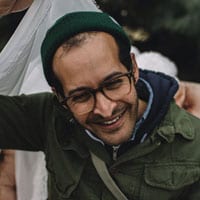 Course Description: William Stafford says a writer is not so much a someone who has a something to say as they are someone who has found a process that will bring about new things they would not have thought if they had not started to say them. Do you find yourself at times struggling with having something to write about? Or feeling like you do but not knowing where to start with what word? How can we look at writing as a collaborative endeavor, even if the collaboration is only with ourself? As Mr. Stafford alludes to, the writing process begins not with having something but with saying a thing, regardless of what that thing is. Making art is often less about creating something from nothing and more about what we make out of what we have found. Writing is the same, except the things we find we have to let them out first. This generative workshop will center on those two aspects––allowing words to come out for us to find, and then how the findings may guide our creativity to create work.
Course Description: William Stafford says a writer is not so much a someone who has a something to say as they are someone who has found a process that will bring about new things they would not have thought if they had not started to say them. Do you find yourself at times struggling with having something to write about? Or feeling like you do but not knowing where to start with what word? How can we look at writing as a collaborative endeavor, even if the collaboration is only with ourself? As Mr. Stafford alludes to, the writing process begins not with having something but with saying a thing, regardless of what that thing is. Making art is often less about creating something from nothing and more about what we make out of what we have found. Writing is the same, except the things we find we have to let them out first. This generative workshop will center on those two aspects––allowing words to come out for us to find, and then how the findings may guide our creativity to create work.
Bio: Anis Mojgani is the current Poet Laureate of Oregon. His work has appeared on HBO, NPR, and in the pages of the NY Times. Both a writer and artist, Anis is the author of six books of poetry, the opera libretto for Sanctuaries, and a picture book forthcoming in 2025. His most recent book is, The Tigers, They Let Me. Originally from New Orleans, Anis lives in Portland Oregon.
Prose Workshop
Based on a True Story: Your Personal Life on the Page
with Sarah Grace McCandless
August 5, 7, 9 • 1:15 – 3:15 p.m. • Prose Room, Literary Arts Center at Alumni Hall
Course # 1533
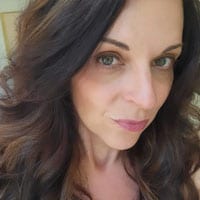 Course Description: From moments of wonder to woe and everything in between, experiences from our own lives make for deeply compelling stories. This workshop will help you uncover the personal story you were meant to tell and how to use that as a jumping off point, whether you decide to keep it rooted in fact or leverage it as foundation for a fictionalized world. We’ll explore techniques related to the craft of writing both ways, including exercises to help you turn that experience into an extraordinary story. We’ll also review and discuss excerpts of works from other writers to inspire possible ways to approach, provide a better understanding of similarities and differences in formats, and clarify parameters to keep in mind. Participants will work on story drafts, share their work in a safe, supportive environment, and leave with specific tools for taking their work to the next stage.
Course Description: From moments of wonder to woe and everything in between, experiences from our own lives make for deeply compelling stories. This workshop will help you uncover the personal story you were meant to tell and how to use that as a jumping off point, whether you decide to keep it rooted in fact or leverage it as foundation for a fictionalized world. We’ll explore techniques related to the craft of writing both ways, including exercises to help you turn that experience into an extraordinary story. We’ll also review and discuss excerpts of works from other writers to inspire possible ways to approach, provide a better understanding of similarities and differences in formats, and clarify parameters to keep in mind. Participants will work on story drafts, share their work in a safe, supportive environment, and leave with specific tools for taking their work to the next stage.
This flexible workshop is open to writers of all levels, from those who already have some initial ideas in mind to those who have no idea where to begin. The only prerequisites are coming with a curious mind and open heart.
Bio: Sarah Grace McCandless is the author of two fiction novels, Grosse Pointe Girl: Tales from a Suburban Adolescence and The Girl I Wanted to Be, both published by Simon & Schuster. A flash memoir edition of Grosse Pointe Girl was previously published by Future Tense Books. Her work has also appeared in numerous collections and journals, including Drawing Lines: An Anthology of Women Cartoonists (Dark Horse Comics), Cassette From My Ex: Stories and Soundtracks of Lost Loves (St. Martin’s Press), and the Past Ten journal.
A Writing by Writers Mill House Residency recipient, Sarah Grace has facilitated creative writing, fiction, and memoir classes at Gotham Writers, the Aspen Ideas Festival, and the Cape Cod Writers’ Workshop. She has adapted her second novel for the screen and is currently working on several new projects, including a scripted series and a memoir.
Sarah Grace is also the producer of #1 New York Times best-selling author and Emmy® Award-winning producer Kwame Alexander’s podcast Why Fathers Cry, inspired by his memoir, Why Fathers Cry at Night. She has previously served as both a producer and performer for live storytelling events including Mortified and Backfence. Sarah Grace currently resides just outside of Portland, Oregon, with her Corgi-Terrier mix, Gilda Radner. More info at SarahGraciously.com
Week Eight
Poetry Workshop
Making the Personal Universal: Impossible, Yet Necessary
with Jim Daniels
August 12, 14, 16 • 8:30 – 10:30 a.m. • Poetry Room, Literary Arts Center at Alumni Hall
Course # 1518
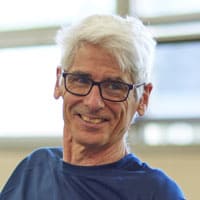 Course Description: Poets at all levels sometimes struggle to make their poems clear, to translate their lived experiences to the page in ways that are accessible to general readers, particularly when they are writing about personal subjects. This flexible workshop will focus on helping you achieve a greater degree of clarity while writing about personal topics without losing the precision of poetic expression. Writing assignments will be based on poems culled from recent literary journals and books to give students a sense of what is new in contemporary poetry.
Course Description: Poets at all levels sometimes struggle to make their poems clear, to translate their lived experiences to the page in ways that are accessible to general readers, particularly when they are writing about personal subjects. This flexible workshop will focus on helping you achieve a greater degree of clarity while writing about personal topics without losing the precision of poetic expression. Writing assignments will be based on poems culled from recent literary journals and books to give students a sense of what is new in contemporary poetry.
Bio: Jim Daniels’ latest book, The Luck of the Fall, fiction, was published by Michigan State University Press in July. Recent poetry collections include The Human Engine at Dawn, Wolfson Press, Gun/Shy, Wayne State University Press, and Comment Card, Carnegie Mellon University Press. His first book of nonfiction, The Abridged Book of Water, is forthcoming from Cornerstone Press. A native of Detroit, he currently lives in Pittsburgh and teaches in the Alma College low-residency MFA program.
Prose Workshop
Caressing the Details: The Art and Power of Description
with Kristin Kovacic
August 12, 14, 16 • 1:15 – 3:15 p.m. • Prose Room, Literary Arts Center at Alumni Hall
Course # 1534
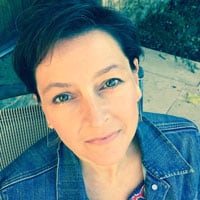 Course Description: Observation and description are muscles that writers in all genres must exercise. But the discipline of observing–closely, deeply, and without prejudice–and then describing–subtly, sensually, and accurately–can be hard to practice in a world that mostly demands snap judgments, snap chats, and instant images. To what extent have the mediated environments we live in–our news feeds our windows, our smart phones our eyes–blinded us to the divine particulars of what it means to be alive? What could we understand better about the present, or the past, if we observed them with more reverent attention? This generative workshop is for prose writers of all levels who want to strengthen their powers of perception and description. Exercises, writing assignments, and discussions will guide writers towards discovering details that can lead to meaningful patterns, arguments, and even revelations in their work.
Course Description: Observation and description are muscles that writers in all genres must exercise. But the discipline of observing–closely, deeply, and without prejudice–and then describing–subtly, sensually, and accurately–can be hard to practice in a world that mostly demands snap judgments, snap chats, and instant images. To what extent have the mediated environments we live in–our news feeds our windows, our smart phones our eyes–blinded us to the divine particulars of what it means to be alive? What could we understand better about the present, or the past, if we observed them with more reverent attention? This generative workshop is for prose writers of all levels who want to strengthen their powers of perception and description. Exercises, writing assignments, and discussions will guide writers towards discovering details that can lead to meaningful patterns, arguments, and even revelations in their work.
Bio: Kristin Kovacic’s essays have won the Pushcart Prize, the Pennsylvania Council on the Arts Fellowship, and the Orison Books Prize for Best Spiritual Writing, among other awards. Her work has appeared recently in Slate, Belt, The Coachella Review, Chautauqua, Table Magazine, and other publications. She is the co-editor of Birth: A Literary Companion, the author of the poetry chapbook, House of Women, and the essay collection History of My Breath. She has taught nonfiction writing at every level, including at Winchester Thurston School, the Pittsburgh High School for the Creative and Performing Arts, and in the graduate programs of Carlow University and Chatham University. She lives and works in a deconsecrated Catholic church on the South Side of Pittsburgh.
Multi-Genre Workshop
A Summer of Wonder: Seeing Nature and Writing It in Chautauqua
with John Brantingham
August 15 • 8:30 – 10:30 a.m. • Prose Room, Literary Arts Center at Alumni Hall
Course # 1536
Session Four | Week Eight: Nature Big and Small
 Course Description: A summer-long class that combines in-person and online elements. We will be studying writing in the classroom at the Chautauqua Institution. Along with this, every day of the season, participants in the class will receive a video prompt for a poem and a prose piece. These prompts will be unified so students who do participate in this activity will have a complete first draft of a poetry or prose collection at the end of the summer. John Brantingham will help them to publish these collections in magazines and as book-length collections. Students who do not want to write will not have to. This is completely optional, so if you are interested in intensive writing or if you are just interested in the history and methods for nature writing, this is a class for you.
Course Description: A summer-long class that combines in-person and online elements. We will be studying writing in the classroom at the Chautauqua Institution. Along with this, every day of the season, participants in the class will receive a video prompt for a poem and a prose piece. These prompts will be unified so students who do participate in this activity will have a complete first draft of a poetry or prose collection at the end of the summer. John Brantingham will help them to publish these collections in magazines and as book-length collections. Students who do not want to write will not have to. This is completely optional, so if you are interested in intensive writing or if you are just interested in the history and methods for nature writing, this is a class for you.
Bio: John Brantingham was Sequoia and Kings Canyon National Parks’ first poet laureate and a Professor of English and Creative Writing at Mt. San Antonio College for 25 years. His work has been featured in hundreds of magazines, Writers Almanac and The Best Small Fictions 2016 and 2022. He has twenty-one books of poetry and fiction including his novella-in-flash Life: Orange to Pear (Bamboo Dart Press) and memoir-in-flash Kitkitdizzi with Ann Brantingham (Bamboo Dart Press). His series of poetry and prose books about nature is coming soon from Arroyo Seco Press. He is the founder and general editor of The Journal of Radical Wonder.
Week Nine
Poetry Workshop
Pitbull or Poodle: Tone and Its Effects in Poetry
with Tim Seibles
August 19, 21, 23 • 8:30 – 10:30 a.m. • Poetry Room, Literary Arts Center at Alumni Hall
Course # 1519
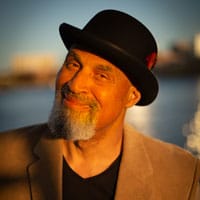 Course Description: Too often, tone is ignored or thought to be secondary to the life of a poem, but tone always affects the way a reader (or listener) receives the words and, consequently, has a lot to do with how a poem means. As children all of us learned to read someone’s tone of voice. We could tell if we were in for a good time or a spanking by a parent’s or a teacher’s tone. We also quickly understood what tones of voice we should (or should not) use when addressing adults or peers.
Course Description: Too often, tone is ignored or thought to be secondary to the life of a poem, but tone always affects the way a reader (or listener) receives the words and, consequently, has a lot to do with how a poem means. As children all of us learned to read someone’s tone of voice. We could tell if we were in for a good time or a spanking by a parent’s or a teacher’s tone. We also quickly understood what tones of voice we should (or should not) use when addressing adults or peers.
By focusing on tone, a writer becomes more capable of expressing various ideas and the accompanying emotions. This is one of the keys to creating memorable poems. In this generative workshop we will examine works by established poets and, using prompts, participants will generate original poems.
Bio: Tim Seibles was born in Philadelphia in 1955. He was the Poet Laureate of Virginia from 2016 to 2018. His poems engage many aspects of life, from the romantic to the sociopolitical to the mystical. He is a former National Endowment for the Arts fellow and Provincetown Fine Arts Work Center fellow.
His seven books include Hurdy-Gurdy, Hammerlock, Buffalo Head Solos, and Fast Animal, a finalist for the 2012 National Book Award, winner of the Theodore Roethke Memorial Poetry Prize and the Pen Oakland Josephine Miles Award for Poetry. One Turn Around the Sun, an extensive examination of his immediate family was released in 2017.
In the last year, Tim has also written poems for two monuments. One in Norfolk, dedicated to the Norfolk 17 who began the fearful process of integrating Virginia public schools, the other for an installation in Dallas, Texas, that addresses the many race-based lynchings that took place there.
His poems have appeared in several anthologies. Among them: In Search of Color Everywhere, Seriously Funny, Uncommon Core, This is The Honey, and Villanelles. Seibles’ works have also been featured in Best American Poetry 2010, 2013, 2023. His latest collection, Voodoo Libretto: New & Selected Poems was published by Etruscan Press in 2020.
Prose Workshop
Title: TBD
with Denene Millner
August 19, 21, 23 • 1:15 – 3:15 p.m. • Prose Room, Literary Arts Center at Alumni Hall
Course # 1535
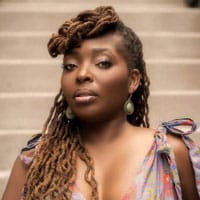 Bio: Denene Millner is a six-time New York Times bestselling author, Emmy Award–nominated TV show host and award-winning journalist who has written thirty-three books, among them, her latest work, a novel, One Blood, Taraji P. Henson’s Around the Way Girl, and the picture book, Early Sunday Morning. Millner is also the editorial director of Denene Millner Books, an award-winning imprint that has published two Caldecott Honor books, a Newbery Honor Book, the Kirkus Prize for Children’s Literature and a Southern Book Award. A MacDowell Fellow, Millner has written essays for the New York Times, Glamour and NPR, which hosted her critically-acclaimed podcast, “Speakeasy with Denene.” Millner is a graduate of Hofstra University. She lives in Atlanta with her two daughters and their goldendoodle, Franklin.
Bio: Denene Millner is a six-time New York Times bestselling author, Emmy Award–nominated TV show host and award-winning journalist who has written thirty-three books, among them, her latest work, a novel, One Blood, Taraji P. Henson’s Around the Way Girl, and the picture book, Early Sunday Morning. Millner is also the editorial director of Denene Millner Books, an award-winning imprint that has published two Caldecott Honor books, a Newbery Honor Book, the Kirkus Prize for Children’s Literature and a Southern Book Award. A MacDowell Fellow, Millner has written essays for the New York Times, Glamour and NPR, which hosted her critically-acclaimed podcast, “Speakeasy with Denene.” Millner is a graduate of Hofstra University. She lives in Atlanta with her two daughters and their goldendoodle, Franklin.
